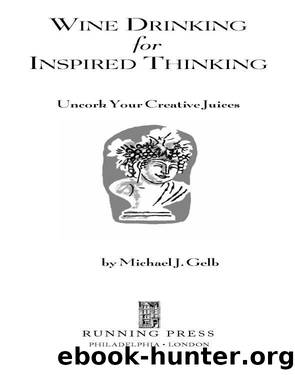Wine Drinking for Inspired Thinking by Michael J. Gelb

Author:Michael J. Gelb
Language: eng
Format: epub
Publisher: Running Press
VINTAGE PORT WITH REAL BLUE STILTON CHEESE AND WALNUTS
Evelyn Waugh (1903 -1966), author of Brideshead Revisited, described port as âthe comfort of age and the companion of the scholar and the philosopher.â You donât have to be old or scholarly to enjoy one of the worldâs truly great wines. As for philosophy, Louis Pasteur noted, âA bottle of wine contains more philosophy than all the books in the world.â And a bottle of vintage port may be the most highly extracted form of liquid philosophy. Best enjoyed at the end of a perfect meal with colleagues and friends, port is especially conducive to philosophical musing and social bonding.
In traditional British custom, the host fills the glass of the guest sitting to his right and then passes the decanter to the left (the âportâ side in British Naval parlance). That guest fills the hostâs glass and passes the port along in a clockwise rotation until the decanter returns to the host. If the progress of the port is stalled, one doesnât ask for the decanter directly. Instead, the person who has delayed the bottleâs progression is asked, âI say, do you know the Bishop of Norwich?â This is a reference to a blathering bishop known for descanting endlessly while remaining oblivious to those awaiting their port. Those in the know will immediately pass the port, but ignorance of the ritual may result in a response such as âCanât say that I do.â And the traditional reply is âHeâs a jolly nice fellow, but he never seems to remember to pass the port.â
Another aspect of traditional port etiquette is that the entire bottle is enjoyed before the evening is out. This usually isnât an issue since fine vintage port is so good that guests often feel itâs the simply the best wine theyâve ever tasted.
The ideal accompaniment is the âking of cheeses,â Stilton. British author G. K. Chesterton (1874 -1936) was a gourmand who tipped the scales at almost three hundred pounds. He once commented to his much slimmer friend, the playwright, wine-lover, and notorious wit George Bernard Shaw, âTo look at you, one would think that England was struck by famine.âShaw shot back, âTo look at you, one would think you caused it.âMany great poets have been inspired by wine, but Chesterton is one of the few to offer an ode to cheese. He observed, âPoets have been mysteriously silent on the subject of cheese.â Chesterton filled this poetic lacuna with his âSonnet to a Stilton Cheese.â It begins:âStilton, thou shouldst be living at this hour
And so thou art. Nor losest grace thereby;
England has need of thee, and so have I.â
Download
This site does not store any files on its server. We only index and link to content provided by other sites. Please contact the content providers to delete copyright contents if any and email us, we'll remove relevant links or contents immediately.
| Buying Guides | Cellars |
| Champagne | Collecting |
| Spirits | Whiskey |
| Wine | Wine Pairing |
| Wine Tasting |
Whiskies (Collins Gem) by dominic roskrow(42291)
101 Whiskies to Try Before You Die by Ian Buxton(42257)
Whiskies Galore by Ian Buxton(40508)
Craft Beer for the Homebrewer by Michael Agnew(17463)
Right Here, Right Now by Georgia Beers(3511)
Not a Diet Book by James Smith(2740)
Water by Ian Miller(2595)
The Coffee Dictionary by Maxwell Colonna-Dashwood(2543)
Kitchen confidential by Anthony Bourdain(2319)
Coffee for One by KJ Fallon(2017)
Smuggler's Cove: Exotic Cocktails, Rum, and the Cult of Tiki by Martin Cate & Rebecca Cate(1995)
Beer is proof God loves us by Charles W. Bamforth(1935)
Superfood Smoothie Bowls: Delicious, Satisfying, Protein-Packed Blends that Boost Energy and Burn Fat by Chace Daniella(1915)
Talking as Fast as I Can by Lauren Graham(1846)
Bourbon: A Savor the South Cookbook by Kathleen Purvis(1802)
A Short History of Drunkenness by Forsyth Mark(1732)
Eat With Intention by Cassandra Bodzak(1698)
Cocktails for the Holidays by Editors of Imbibe magazine(1635)
Colombia Travel Guide by Lonely Planet(1622)
